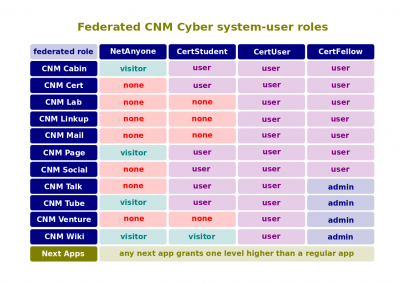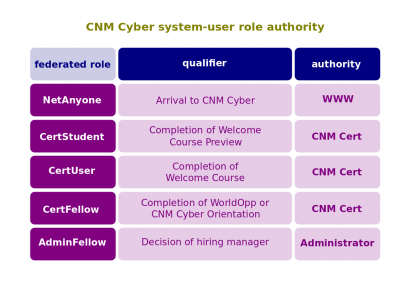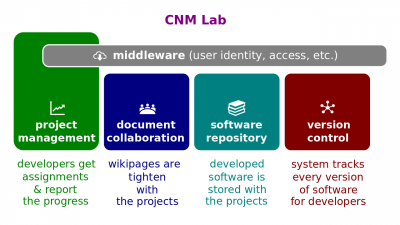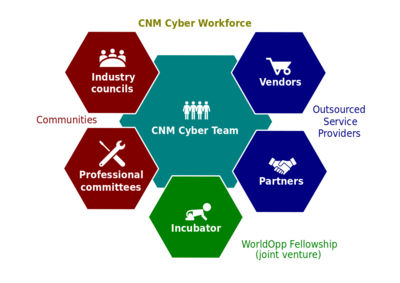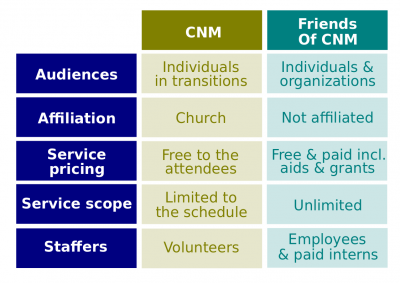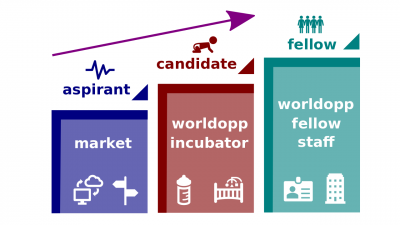Difference between revisions of "CNMC for Experience"
(→CNM Cyber Workforce) |
(→CNM Cyber Workforce) |
||
| Line 106: | Line 106: | ||
|1||'''[[CNM Cyber Team]]''', [[Career Network Ministry]] ([[Career Network Ministry|CNM]]), [[volunteer]]; '''[[WorldOpp Fellow Staff]]''', [[Friends Of CNM]], [[employee]], [[independent contractor]] | |1||'''[[CNM Cyber Team]]''', [[Career Network Ministry]] ([[Career Network Ministry|CNM]]), [[volunteer]]; '''[[WorldOpp Fellow Staff]]''', [[Friends Of CNM]], [[employee]], [[independent contractor]] | ||
|- | |- | ||
| − | ![[CNM Cyber Workforce#Cyber Teams' | + | ![[CNM Cyber Workforce#Cyber Teams' Assignments|Cyber Teams' Assignments]] |
|2||'''[[Departmentalization]]''', [[area of responsibility]] | |2||'''[[Departmentalization]]''', [[area of responsibility]] | ||
|- | |- | ||
Revision as of 16:36, 19 April 2020
CNM Cyber for Experience (hereinafter, the Session) is a learning session introducing its participants to CNM Work Suite and work at CNM Cyber. The Session consists of three lessons, each of which is made of three to five lesson parts, called lectios. Every lectio includes a presentation and a quiz. The official version of the Session is published at CNM Cert. Its materials are also published at CNM Page, CNM Talk, CNM Wiki, and various channels for marketing and convenience purposes.
The Session is the final of four sessions of the CNM Cyber Welcome Course.
Contents
Outline
The predecessor activity is the CNM Cyber for Action.
CNM Cabin Essentials
- Main wikipage: CNM Cabin Essentials
- CNM Cabin. The user management system of CNM Cyber that is delivered to its end-users as a service.
- User management system. Any system for the administration of system-user roles and user data, as well as tracking and reporting user datas to the authorized administrators and the end-user whose actions have produced that data.
- User dashboard. The feature that provides the end-user with a user interface (UI) that displays user data and those features that are available to the end-user of a particular system or system of systems.
- User account. In systems engineering, a system document that authorizes a particular end-user to access and use this system. From the user perspective, a user account is the means by which this user can access the system.
- Username (login name, account name, handle, or, rarely, ID). The humanly-readable name of user account that the end-user utilizes to access that account. A username is an essential part of user data.
- Password (passcode). Any string of characters that is used to confirm user's identity. The NIST Digital Identity Guidelines defines a password as "the secret is memorized by a party called the claimant while the party verifying the identity of the claimant is called the verifier. When the claimant successfully demonstrates knowledge of the password to the verifier through an established authentication protocol, the verifier is able to infer the claimant's identity.
- System-user role. The set of capacities often called permissions that a system grants to any user who belongs to a particular role.
- NetAnyone. The system-user role for an end-user of the World Wide Web whom CNM Cyber hasn't identified yet.
- CertStudent. The system-user role that CNM Cyber grants upon completion of the CNM Cyber Welcome Course Preview.
- CertUser. The system-user role that CNM Cyber grants to any graduate from the CNM Cyber Orientation.
- CertFellow. The system-user role that CNM Cyber grants to any graduate from CNM Cyber Placement.
- Authentication. The process of verifying one's identity. That process is commonly paired with identification, which is the process of indicating one's identity. For instance, the process of issuing one's passport is an act of identification, while the process of verification of one's passport at a checkpoint is an act of authentication is the process of verifying that identity. When a system user provides the system with his or her username, the system requests its database whether that user is identified in this system and, if so, with what password, and authenticate that user based on whether the password matches the one in the database.
- Single sign-on (SSO). The mode of authentication that allows a user to log in with a single username and password to any of several related, yet independent, software systems, and go through any of those systems without additional logging in.
- Identity and access management (IAM). Practice and a set of concepts based on that practice of granting each user of some system a right system-user role.
- Federated role. The system-user role that is assigned to a user in several related, yet independent, software systems by default. A particular system may or may not override the federated role within that system and re-assign its local system-user role to that particular user. That re-assignment can happen only within one system and cannot affect any other system unless the federal role has been changed.
CNM Lab Essentials
- Main wikipage: CNM Lab Essentials
- CNM Lab. The combination of project management, version control, and file-sharing systems of CNM Cyber that is delivered to its end-users as a service.
- Source code. According to the Linux Information Project, "the version of software as it is originally written (i.e., typed into a computer) by a human in plain text (i.e., human readable alphanumeric characters)." This code commonly include comments and is specially designed to facilitate the work of computer programmers, who specify the actions to be performed by a computer to indicate their intentions.
- Web document. A document that defines another document to target software applications. Web documents are widely used in the Internet. For instance, web browsers use web documents to display webpages to their end-users. Search engine robots use web documents to collect data about those webpages. Those contemporary email clients that are mobile apps use web documents to display emails without web browsers. To those end-user applications that are used to view documents of various formats, web documents may represent documents in the PDF format, graphic elements of image files, etc.
- DevOps. An engineering practice and a set of concepts based on that practice that aim at unifying new product development (the Dev part) and operations (the Ops part). The primary feature of DevOps is to strongly advocate automation and monitoring at all steps of the project such as integration, testing, releasing to deployment, and infrastructure management. DevOps aims at shorter development cycles, increased deployment frequency, more dependable releases, in close alignment with business objectives. Functions of DevOps office staffers can be compared with those of project management office (PMO) in a traditional project management framework.
- Project management system. Any system for project management. Usually, the System is built using project management software, which tends to be a combination of end-user applications specifically designed to aid with planning and controlling project costs and schedules.
- Version control system. The system that is set for version control. The system controls versions or revisions of documents, source codes, files, groups of files, collections of data, and/or other resources.
- File-sharing system. Any software system that enables its users to upload, store, and download files on the Internet.
- Software application. Any digital construct that is installed, instantiated and executed on a computing device, specifically for the purpose of assisting in the capture, creation, manipulation, tracking, management, and reporting of specified data.
- Software repository.
- Cyber-security. The practice and a set of concepts based on that practice that are designed to protect computers, data, and networks from potential attacks or unauthorized access.
- Encryption. A method of encoding data so that it is unreadable to parties without a method of decryption.
- SSL certificate. The system document that (a) is issued by a certificate authority (CA), (b) is based on the Secure Sockets Layer (SSL) protocol, and (c) installed on a web server to allow for a secure connection between this web server and any web browser. Contemporary SSL certificates also support the Transport Layer Security (TLS) protocol.
CNM Cyber Workforce
- Main wikipage: CNM Cyber Workforce
- CNM Cyber Team. The department of the Career Network Ministry (CNM) that administers computer services such as the website at https://careernetworkministry.org, technology skills training for CNM patrons, CNM PMP Bootcamp, and those pages of CNM Wiki that are related to CNM and CNM Cyber. Members of this department are volunteers and are paid no wages or salaries.
- Career Network Ministry (CNM). The outreach team of McLean Bible Church in Northern Virginia, which goal is to provide caring support to individuals during career transitions. The team welcomes any patron from any faith, or no faith, to take full advantage of its services, which include interviewing skills building, resume writing, elevator pitch, job marketing, financial planning, and various types of networking. All services of CNM are delivered by volunteers and are free to all the recipients of these services.
- Volunteer.
- WorldOpp Fellow Staff. The executive department of Friends Of CNM. The Department runs CNM Cloud and CNM Cyber, It consists of WorldOpp fellows, sponsors WorldOpp incubator, and is overseen by the CNM Cyber Community Board.
- Friends Of CNM. A non-government non-political non-religious group of legal entities, every of which is called a CNM friend, that provides the Career Network Ministry (CNM) with CNM Cyber at no cost to the CNM and, furthermore, provides patrons of the CNM with those services that the CNM does not offer. Every CNM friend joins into or separates from the group on a declarative basis. Friends Of CNM's structure is organic. Its distinct areas are:
- WorldOpp Team. Every team member, either a fellow or candidate, of adult age is usually a CNM friend;
- Outsourced service providers, contractors and partners. They are not required, but tend to be CNM friends; and
- CNM Cyber communities. Any friend can create a new community or apply for joining any existing community, but every community may establish its own policies including rules for joining and separating.
- Employee. Any individual whom an employer has hired to exchange his or her worktime for employee compensation. In the United States, this compensation that must include either wages or a salary.
- Independent contractor. A contractor, who is an individual and who provides another legal entity with his or her products, usually, services. The contractor's products are specified under terms of a contract or a verbal agreement.
- Friends Of CNM. A non-government non-political non-religious group of legal entities, every of which is called a CNM friend, that provides the Career Network Ministry (CNM) with CNM Cyber at no cost to the CNM and, furthermore, provides patrons of the CNM with those services that the CNM does not offer. Every CNM friend joins into or separates from the group on a declarative basis. Friends Of CNM's structure is organic. Its distinct areas are:
- Departmentalization. The basis by which organizational units are created and by which jobs in an enterprise are grouped together.
- Pre-entry-level job (student job). An employment that assumes that the employee hasn't possessed yet a complete set of KSAs that the position typically requires. Usually, the incumbent of that job is paid a portion of what the fully-qualified employee would be paid. Often, the incumbent of that job is expected to learn while on the job. His or her payment casually increases as his or her qualifications increase.
- CNM IT Project Coordinator. A volunteer staffer of the CNM IT Office.
- CNM Cloud Project Coordinator. An employee or independent contractor who administratively supports, virtually and/or onsite, CNM Cloud Project and/or owns CNM Cabin, Cert, Lab, Linkup, Mail, Page, Servers, Social, Venture, Talk, Tube, Wiki, and/or its components.
- WorldOpp incubator. An environment for the care, protection, and growth of those WorldOpp candidates who would like to become WorldOpp fellows.
- Apprentice. Any employee who is not fully qualified to perform his or her workload, but agreed to work usually for a part of the fully-skilled worker compensation under the condition of educational assistance to gain the needed work-related competence.
- Careerprise bizopp (Careerprise business opportunity). An opportunity for a business to become a Careerprise contractor and/or Careerprise partner.
- Careerprise contractor. An independent contractor whom Friends Of CNM hires directly.
- Careerprise partner. A legal entity that takes part in undertakings with Friends Of CNM in order to share those risks and profits that are related to those undertakings.
- Careerprise conference. A CNM Cyber event organized in order to clarify requirements and discuss challenges that Careerprise contractors and/or Careerprise partners face.
No successor session exists in the CNM Cyber Welcome Course. The CNM Cyber Orientation is the next course.

